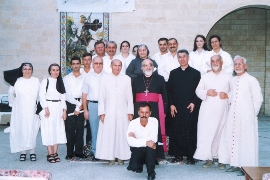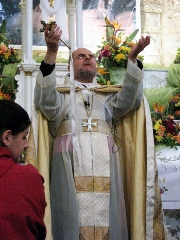| The Suffering Church Worldwide - The Middle East | ||
|
The Church in the Middle East has ancient roots, but in many places it is under threat as never before. Christian communities in Lebanon, Jordan, Syria, Israel, and especially Iraq, have faced rising persecution and intolerance from Muslim extremists and have often been caught in the middle of sectarian conflicts. Israel and Palestine
In the countries that make up the Arabian Peninsula, aside from Saudi Arabia, Christians have a certain amount of religious freedom, but it is increasingly in danger due to the rise of radical Islamists, who could bring instability and civil war to the region. Church-building projects in Kuwait and Qatar have been accused of being contrary to Sharia law. In countries such as Yemen, Christian converts from Islam have been arrested and beaten. Also included in the Arabian Peninsula are Bahrain, Jordan, Oman, and the United Arab Emirates. Muslims are 90% of the population in Egypt, in which Coptic Christians make up another 9% and other Christian denominations account for the last 1%. Islam is the state religion, and while in theory freedom of religion is guaranteed by the Constitution, in practice the rights of non-Muslims are not respected. Christians are discriminated against at administrative levels and in schools and conversions to Christianity can be met with punishment and imprisonment. Christians are denied equal access to jobs and education and rarely obtain government positions. Incidents of violence against Christians also occur.
Christians are only 0.2% of the population of Iran, a 99% Muslim, mostly Shiite (89%) country between Iraq, Afghanistan and Pakistan in which Islam is the state religion. No non-Muslim may suggest that a Muslim change his or her religion, and conversion from Islam is punishable by death. Certain non-Muslim religions are allowed by the government (Judaism, Zoroastrianism, Armenian and Assyrian and certain Protestant Churches) but are strictly controlled. Religions not recognized by the government are forbidden and persecuted. There are about 10,000 to 13,000 Catholics in Iran who follow Chaldean, Armenian, and Latin Rites. About half of the Christians in Iran fled the country after the Islamic Revolution of 1979. Christians are allowed in the government and the army but cannot reach high positions. Since the 2005 elections, religious liberties have deteriorated and Christians have been systematically harassed, some being arrested and beaten. Christian churches are not allowed to accept Muslim converts as members, forcing Muslim converts to Christianity to practice their religion in secret. The situation is easier for Christians in Jordan, where they are 4% of the population in a 96% Sunni Muslim country that lies next to Syria, Iraq, Saudi Arabia, Egypt and Israel. While Islam is the official religion of the state, Christians enjoy equal civic rights and Christian churches are allowed to develop their pastoral, education, and humanitarian activities. Jordan is a peaceful oasis for Christians in the Middle East in many ways, but as a result many refugees, mainly from Iraq, have fled here to escape persecution. In Kuwait, Muslims account for 85% of the population (of which 70% are Sunni and 30% are Shiite) while Christians, Hindus and Parsis make up the remaining 15%. Similar to other Muslim countries, Islam is the religion of the state and legislation is based on Sharia law. Religious freedom is guaranteed, but religious instruction for non-Muslim confessions forbidden, as is attempting to convert Muslims. Conversion from Islam is considered a crime punishable by death, and in 1993-94 a convert to Christianity was condemned to be executed and fled the country, while his wife was kidnapped, raped, and forced to divorce him.
Bordering Tunisia, Algeria, Niger, Chad, Sudan, Egypt and the Mediterranean Sea, Libya is 97% Muslim and 3% other, and has a population of just over 6.17 million people. The rights of religious minorities are guaranteed by law and Christians are allowed to practice their religion. In between Jordan, Iraq, Oman, Yemen, the Red Sea and the Persian Gulf, Saudi Arabia is an almost entirely Sunni Muslim country, except for a tiny number of Christian immigrants. Politically it is an absolute monarchy, and it is the last country in the world where religious liberty is neither recognized nor protected. Islam is not merely the official religion, it is the only religion allowed. The entire territory of Saudi Arabia is considered to be a ‘grand mosque’ and all other religions are prohibited and cannot be practice publically or privately. Religious police make sure the practice of other religions is not visible. Christian immigrants (mainly from Pakistan and the Philippines) or secret converts to Christianity found practicing their religion can be subject to imprisonment, torture and execution, although authorities are more careful with visiting military personal and expatriates.
Turkey is an almost entirely Muslim country (98-99%) with a small Christian population (some 500,000 out of almost 72 million) that borders Syria, Iraq and Iran, as well as Armenia, Georgia, Greece and Bulgaria. The 1982 Constitution reaffirmed Turkey’s status as a secular state in which religious freedom is guaranteed but in which certain religious activities are restricted. In practice, religious minorities are the victims of administrative discrimination and government control. Missionary activity is theoretically allowed but is, in fact, limited. Priests have been attacked and stabbed and Christians have been murdered. Muslim converts to Catholicism hide their conversion and religious activities out of fear of reprisals. On the coast of the Red Sea, the Gulf of Aden, and the Arabian Sea, Yemen has a population of just over 23 million which is 98% Muslim and 2% Jewish, Christian, and Hindus, even though Yemen reports that all its citizens are Muslim. Islam is the state religion and no Christian denominations are allowed, but the small numbers of Jews and Christians (many from India or Pakistan) are not persecuted and are allowed to practice their religions privately. Serious incidents against Christians have occurred in the past decade, including 1995 attack against a hospital and the 1998 assassination of nuns from Mother Teresa’s order. |
||

 Christians are in a unique situation in Israel, where they are 2.5% of a Jewish majority population (82.7%) that also has a significant number of Muslims (12%). Religious freedom is guaranteed and all discrimination is forbidden. The Israeli government does intervene in the affairs of other religions, and marriages between Jews and non-Jews are frowned upon.
Christians are in a unique situation in Israel, where they are 2.5% of a Jewish majority population (82.7%) that also has a significant number of Muslims (12%). Religious freedom is guaranteed and all discrimination is forbidden. The Israeli government does intervene in the affairs of other religions, and marriages between Jews and non-Jews are frowned upon.  Living in a country which borders Syria, Turkey, Iran and Saudi Arabia, Christians in Iraq have faced particularly severe persecution, and their numbers have dwindled as a result of the war. Many Christians have fled the country and those staying have endured the destruction of churches and convents, torture, bombings, death threats, assassinations, kidnappings, murders, and extortion. Islam is the state religion of Iraq, which has a Muslim majority of 97% (60-65% Shiite, 32-37% Sunni). While the rights of religious minorities are guaranteed by law, the government does, in fact, discriminate against Christians.
Living in a country which borders Syria, Turkey, Iran and Saudi Arabia, Christians in Iraq have faced particularly severe persecution, and their numbers have dwindled as a result of the war. Many Christians have fled the country and those staying have endured the destruction of churches and convents, torture, bombings, death threats, assassinations, kidnappings, murders, and extortion. Islam is the state religion of Iraq, which has a Muslim majority of 97% (60-65% Shiite, 32-37% Sunni). While the rights of religious minorities are guaranteed by law, the government does, in fact, discriminate against Christians.  On the coast of the Mediterranean Sea and bordering Israel and Syria, Lebanon has one of the highest concentrations of Christians in a majority Muslim country. Christians make up 40% of the population, while the remaining 60% are Muslim and are divided among a variety of sects. A small number of people are from other faiths. The government formally recognizes 17 religious confessions. Discrimination against Christians still does occur in certain situations, and attacks against Christians, including bombings, have also occurred.
On the coast of the Mediterranean Sea and bordering Israel and Syria, Lebanon has one of the highest concentrations of Christians in a majority Muslim country. Christians make up 40% of the population, while the remaining 60% are Muslim and are divided among a variety of sects. A small number of people are from other faiths. The government formally recognizes 17 religious confessions. Discrimination against Christians still does occur in certain situations, and attacks against Christians, including bombings, have also occurred.  Syria is 74% Sunni Muslim, 16% Muslims of other denominations, and 10% Christian, with tiny communities of Jews in Damascus, Al Qamishli, and Aleppo. Religious freedom is guaranteed by the Constitution, but the Head of State must be Muslim. Discrimination against Christians does occur in certain situations, and the emigration of Christians from the country due to rising Islamic fundamentalism and lack of economic opportunity continues to cause the already small population of faithful to shrink further, threatening the Christian community with extinction. At the same time, many Christian refugees have fled to Syria from Iraq.
Syria is 74% Sunni Muslim, 16% Muslims of other denominations, and 10% Christian, with tiny communities of Jews in Damascus, Al Qamishli, and Aleppo. Religious freedom is guaranteed by the Constitution, but the Head of State must be Muslim. Discrimination against Christians does occur in certain situations, and the emigration of Christians from the country due to rising Islamic fundamentalism and lack of economic opportunity continues to cause the already small population of faithful to shrink further, threatening the Christian community with extinction. At the same time, many Christian refugees have fled to Syria from Iraq.